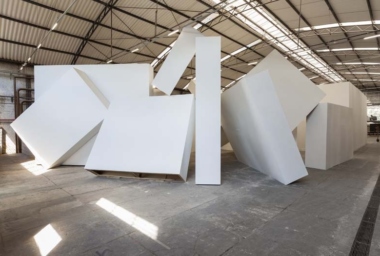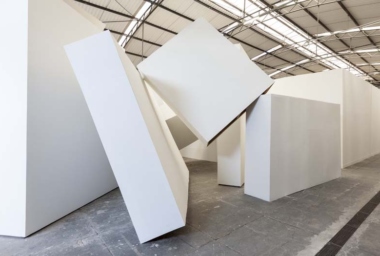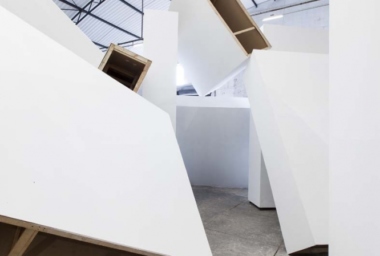In Pano de Fundo [Backdrop] Ramo once again puts us into an unusual place. Mobile panels, normally used for setting up the exhibition space at the Galpão, are balanced delicately, one atop the other, forming a large sculpture. The apparently neutral material takes on a life of its own, reorganizing itself as though it were about to fall. The public is invited to walk among the stacked panels.
This sculpture is a development of previous works where the compositions also had their starting point based on randomness. In Legado [Legacy], 2012, made for CA2M of Madrid, we find an absurd construction where walls and beams made of concrete and bricks, are placed one atop the other, creating a labyrinth. Or Avalanche Concreta [Concrete Avalanche], 2010, where a pile of boxes come out of a small door, advancing into space to invade the territory of a gallery.
The artist appropriates elements and scenes from daily life, displacing them from their original places and rearranging them in videos, photographs, collages, sculptures and installations. In a critical and poetic way, in a sort of libertarian discipline, the objects of the world – which for Ramo operate as extensions of ourselves – are reorganized to create new meanings. Formal and conceptual strategies pervade the artist’s work in a constant staging mapping notions such as order and disorder, accumulation and emptiness.
Sara Ramo was born in Madrid, Spain, in 1975, and lives between Spain and Brazil. Her recent exhibitions include Sin Heroismos, Por Favor, at CA2M, Centro Dos de Mayo, Madrid, Spain, and Penumbra, at Fundação Eva Klabin, Rio de Janeiro, Brazil, both in 2012. The artist participated in the Panorama de Arte Brasileira of MAM-São Paulo in 2011, and in the 2010 Bienal de São Paulo. Besides exhibitions at other institutions of national and international importance, the artist also participated in the 2009 Venice Biennale. Her work figures in the collections of Inhotim, Belo Horizonte, Brazil; the Museu de Arte Moderna do Rio de Janeiro, Brazil; Instituto Cultural Itaú, São Paulo, Brazil; and the Fundacione Casa di Risparmio di Modena, Italy, among others.




